In Week 4 of GROW Mental Health Recovery’s six-week initiative ‘Create Hope and Stay Positive’ in the face of Covid-19, we will focus on the importance of routine.
Check in every day as we explain how creating a structure will benefit your mental health and we provide tips through our podcast, audio, recipe, and a reading, with with further practical advice.
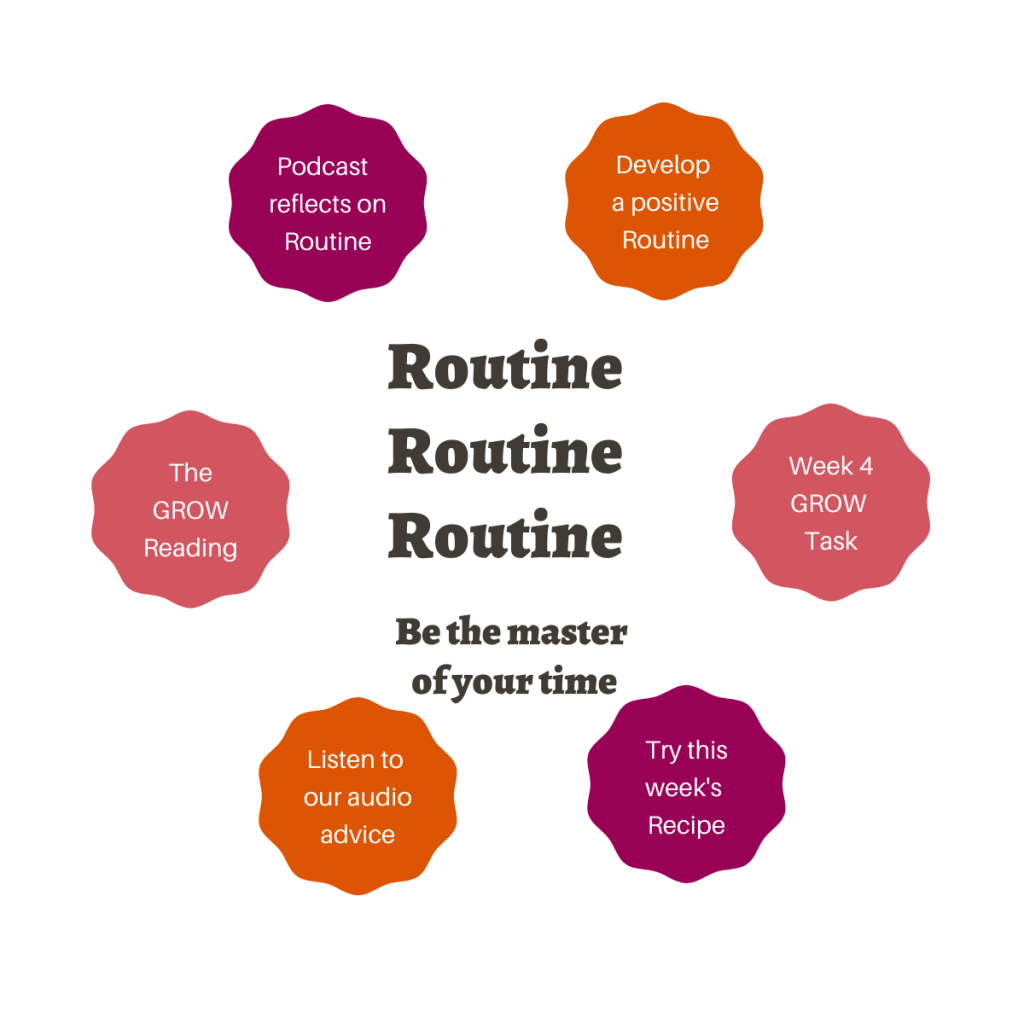
Listen to our podcast
Week 4: Routine, Routine, Routine
For many of us, any change of routine can be difficult to cope with, so the upheaval caused by the Coronavirus pandemic takes a lot of getting used to.
One of the crucial factors in looking after our mental health during this time is developing a routine and sticking to it.
Stay as much as possible within your usual timelines eg waking up, meal times, sleep time etc.
Make a plan for your day/week and stick to it as much as possible as this will not only help you, but also everyone in the house. It may take a few days to figure it out but it is important not to let things drift.
For example, if you are helping children with school work, find a time that suits every day and get it finished. If you have work or college work to do at home, again stick to your daily routine. It is important to know when to switch off and leave the office behind.
Also, schedule time for household chores or a bit of gardening/DIY but don’t overdo it. Remember we are likely to have a few weeks at home so there will be plenty of time to get everything done.
This is a great time to factor in some exercise into your daily routine, so once again set aside that time and don’t forget to vary your type of exercise or route if it is a walk or cycle – just to keep it interesting.
A part of your routine should also include some ‘Me Time’. Make sure you create a little bit of space for yourself to get away from it all – whether that is taking a quiet walk, having a bath, reading or a bit of relaxation etc.
Plan your time
- Be the master of your time
It is vital for our mental health that we have a definite structure that allows us to take control of our day and week, rather than just drifting along.
Here is an example of a chart that can help you make plans
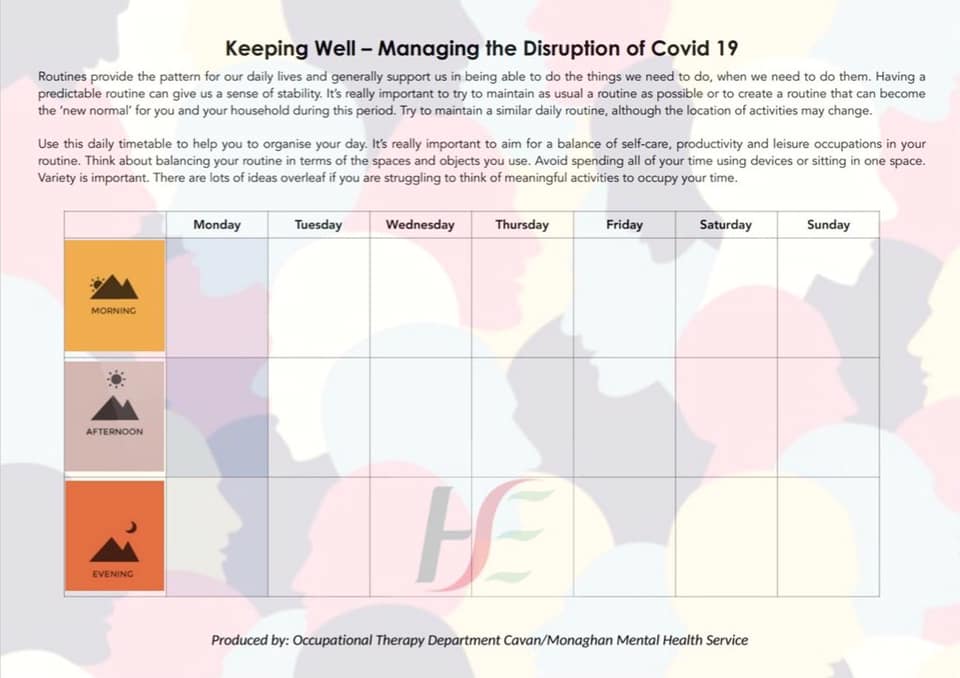
Choose some activities for your routine
Although we are restricted in our movements, there are plenty of activities available to us to use as part of your daily and weekly routine. See below for some useful suggestions.
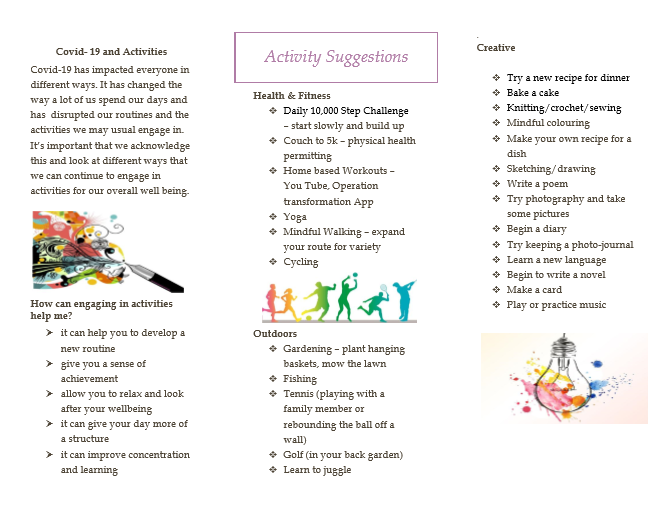
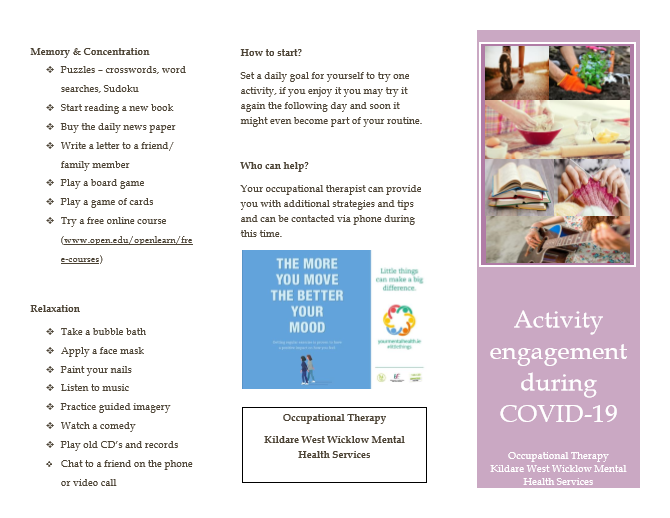
GROW Audio: Routine
Caroline Crotty, GROW Mental Health Recovery Area Co-ordinator, provides some excellent tips and advice on the importance of routine during the Covid-19 restrictions.
GROW Recipe
- We are what we do repeatedly, developing routine
Cooking is a great way to stay connected – by having your family join in or it is something you could discuss with your friends and recommend they try it out.
If you get a chance, why not try out this week’s recipe which will help the overall aim of growing your mindset through wellness and self-care.
Curried Chicken Stew – kindly provided by RéNua Natural Health
Brief: Food – Batch cooking a well-balanced healthy meal
Suggestion: One pot meal, comforting and plentiful, offering reassurance. Quick preparation yet slow to cook. Repeatable recipe. Versatile dish, ingredients can be swapped out for other ingredients – can follow the same steps with different ingredients.
Serve with: Brown Rice
Rationale:
· Simple prep guide yet slow cooking reminds the chef to be mindful preparing meals and rewards the chef with a wholesome meal after the wait.
· Appeals to olfactory and visual types. The smell of cooking food is a very powerful trigger for reassurance, comfort and endurance (survival). The mild curry spices are great for lingering aromas.
· Versatility – can be a stew as is, or double the stock and can be made into a soup
· Suitable for several days or frozen for later.
· Nutritional Profile
o Excellent source of protein, betacarotene and fibre
o Good source of B vitamins, magnesium and calcium
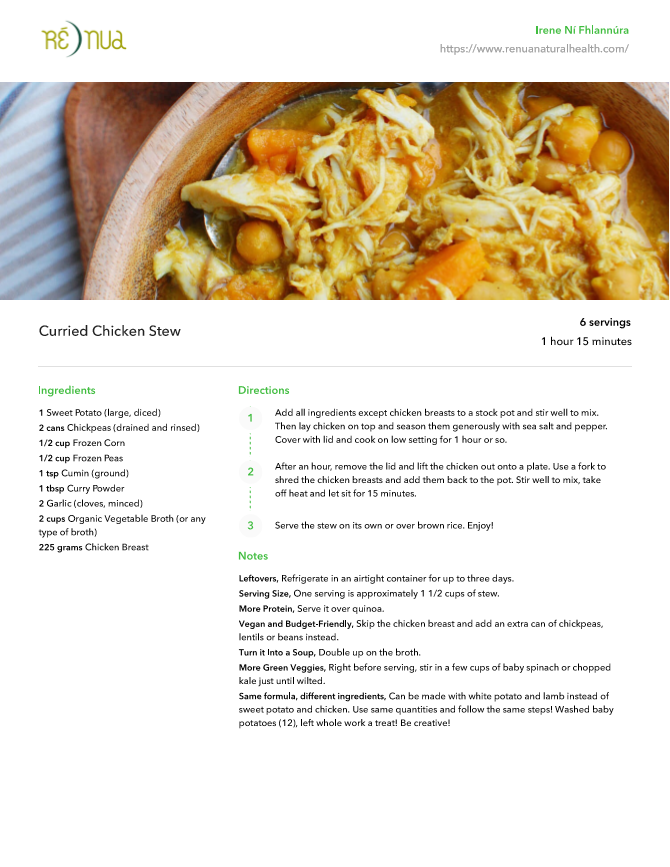
GROW Wisdom
The best in life, love and happiness is ahead of us
GROW Reading
Negative or Positive Mental Attitude
In any random selection of maladjusted people two types would probably stand out above all others. They are certainly the commonest problem-types we meet in GROW. What are they?
First, those who are habitually and extremely critical, distrustful and accusing towards themselves, and whose emotional disharmony follows mainly the line of unreasoning anxiety.
Secondly, those who are habitually and extremely critical, distrustful, and accusing towards others and whose emotional disharmony follows mainly the line of unreasoning anger and resentment.
Unless these people make up their minds to change and work hard on themselves until they do change, they have no hope of every being well and happy.
Self-pity is a further common feature and complication of both these negative groups. What is self-pity, basically? It is an over-realising or exaggeration and dramatisation of your own troubles and suffering, combined with (a) a neglect or under-appreciation of your blessings, and (b) a ridiculously rosy and unsympathetic view of what life is like for others.
The above habits, and others like them, all combine to form a general pattern of negative thinking and negative living. Negative Mental Attitude – NMA – means believing that, on the whole, evil is overcoming good in you and round about you.
Health and happiness, on the contrary, are the fruits of Positive Mental Attitude – PMA. This is basically a way of thinking, talking and acting which flows from the belief that evils and trouble and never stronger or more significant than the love and powers of good that are working in you and for those you love.
Positive Mental Attitude is made up of appreciation and tolerance (appreciation of the good and tolerance of the incidental bad in yourself and others).
PMA is continuing, in the face of frailty and failure, to believe in and to reaffirm your love for others and their love for you.
PMA is a habit of judging kindly both yourself and others.
PMA is keeping the whole picture in personal inventory and realising that th blessings of life always outweigh the burdens.
PMA is emphasising what is, not what isn’t.
PMA is the courage to use yourself, to learn through making mistakes and to emphasise always the progress, not the mistakes.
PMA is confidence in yourself and trust in others.
PMA is encouragement and transforming co-operation with others. It means not so much opposing the faults we find in others as rivalling them – that is, not attacking, denouncing and rejecting them because of those faults, but showing them, if we can, and helping them to find and share with us, a better way.
It is a law of life that people either live down to, or live up to, the level of behaviour which those who emotionally come closest to them think they are capable of.
PMA is peace and joy and cheerfulness outweighing whatever feelings of distress we have over present troubles or threatening prospects; for positive thinking enables us to keep the whole picture and to go by the permanent and developing reality that we know, not by the shifting appearances of things and our short-lived instinctive reactions, which can be so deceptive.
PMA is indomitable hope and expectation of future good for ourselves and our fellow-men.
The Weekly Takeaway
One of the main reasons behind this six-week initiative was to help people cope with the Covid-19 restrictions and members in the North East & East have come up with their own way of dealing with the challenge. Area Co-ordinator, Louise Carroll, explains that The Weekly Takeaway is about.
Working with GROW Mental Health Recovery groups over the past 12 years I have learned so much from members. During conversations with members over the years about their experiences of their first GROW meeting I noticed a similarity in their stories.
Members would very often talk about how they entered GROW looking for a way to forget, leave behind and blank out certain experiences they had lived through. A struggle within themselves and a difficulty in accepting that some of their life experiences had brought deep sadness and pain. This daily struggle of trying run from the memories of these experiences often led to a feeling of exhaustion, hopelessness, depression, isolation, anxiety, stress and/or other mental health difficulties.
The GROW Program encourages us to admit when we have lost our way and need direction. This can be difficult, but once we admit this we can than reach out for help and begin to be our true self. Our true self is our happy self – GROW Program. Members would talk about how attending weekly GROW meetings helped them see more clearly that in everyone’s lives there will be times of sadness and pain and trying to run from these experiences is futile.
GROW encourages us to accept the things we cannot change and to have the courage to change the things we can. We slowly begin to own our experiences, both good and bad. Taking back control in what we can do. This helps us to use all our experiences to help ourselves and others.
A seasoned GROW member welcoming a new member into a meeting, encouraging and talking openly about their experience of attending their first meeting, this is a great example of using our experiences to help ourselves and others.
The Covid 19 pandemic has had an affect on our day to day lives. We have been asked to stay home, isolate from our communities, elderly loved ones and follow social distancing. I asked members if they would like to start a WhatsApp group called The Weekly Takeaway. Members post once a week what they are taking away from living through this time, this experience. What can we learn from this that can be used as a personal resource in helping us to accept, adapt and move forward in the future? We cannot change that this pandemic is happening, we have to accept this fact, but we can change how we react to it and takeaway learning from living through this time in our lives.
Members have posted such inspirational, uplifting, honest, funny and heartfelt takeaways. I asked members if we could share these posts so others can be inspirited, enjoy and learn from everyone’s experiences. Members are happy to share and let their learning help others. In helping others we help ourselves – GROW program.
Louise Carroll – Area Coordinator North East/East


